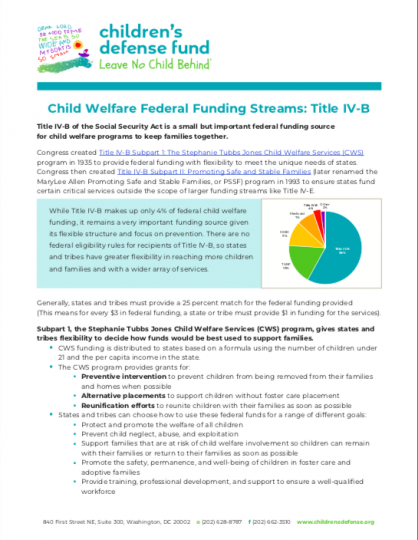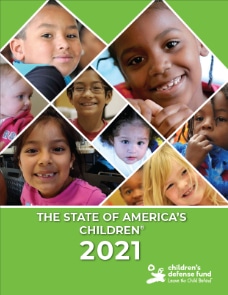
Child Welfare Federal Funding Streams: Title IV-B
While Title IV-B makes up only 4% of federal child welfare funding, it remains a very important funding source given its flexible structure and focus on prevention. There are no federal eligibility rules for recipients of Title IV-B, so states and tribes have greater flexibility in reaching more children and families and with a wider array of services.
CDF Joins Calls to Ensure Legal Counsel for Children and Families Involved in Child Welfare Court Proceedings
All parties in child welfare court proceedings deserve effective legal representation to advocate for their needs, to navigate the complex labyrinth of executive and judicial branch processes, and to amplify their voice as courts make life-altering decisions. We urge the House Committee to include guaranteed legal counsel in CAPTA Reauthorization
The Ensuring Medicaid Continuity for Children in Foster Care Act of 2021 (S. 2689) Would Lead to Significant Unintended Consequences for Children in the Care of the Child Welfare System
Exempting QRTPs from the IMD exclusion would undermine the goals of Family First, weakening the standards of quality and leading more children to be placed in large-scale institutions, rather than promoting placements with family, as the law intends.
Response to OMB Request for Information to Advance Equity and Support for LGBTQ+ Children and Families in the Child Welfare System
With one in three foster youth identifying as LGBTQ+ and reporting abysmal treatment and outcomes, and LGBTQ+ families also facing inequitable barriers in child welfare services, we stand at a crisis point that requires urgent action by the U.S. Department of Health and Human Services.

The State of America’s Children® 2021
Since the Children’s Defense Fund last published our annual State of America’s Children report in February 2020, our children have experienced a year of unprecedented upheaval due to the COVID-19 pandemic and a racial reckoning years in the making. Every aspect of children’s lives has been impacted by these shifts more quickly than data can track; even the most recent available data sets do not fully encompass how this past year has shaped our lives. This, of course, includes our 2021 State of America’s Children report. Because, as one element of the report makes clear, “Our Children are Not Immune.”
Family First Prevention Services Act: Implementing the Provisions that Support Kinship Families Checklist
Family First Prevention Services Act makes historic reforms to the child welfare system to better support children, families, and kinship caregivers, and promote a kin-first culture. Many of the reforms have significant implications for connecting children to kinship caregivers and further promoting permanency through kin guardianships. This checklist is designed to help child welfare agency staff take advantage of provisions in the law to engage and support kinship families.
Child Welfare Provisions of the Consolidated Appropriations Act, 2021
On December 27, 2020, President Trump signed into law the Consolidated Appropriations Act, 2021, which combines a $1.4 trillion year-end funding package with a $900 million dollar COVID-19 relief package. The law contains several important provisions related to the child welfare system.
CDF Urges HHS to Withdraw the SUNSET Proposed Rule
Regulations play an important role in implementing a wide range of HHS policies and programs serving children and families, including child care, substance use treatment, child welfare, food safety, and health care. CDF is very concerned that the proposed rule will disrupt the ability of the Department of Health and Human Services to efficiently administer critical programs and services for children and families and should be withdrawn immediately.
The Child Welfare Emergency Assistance Act Would Assist Children and Families During the COVID-19 Health Crisis
On July 2, Senators Sherrod Brown (D-OH), Kamala D. Harris (D-CA), Bob Casey (D-PA), and Catherine Cortez Masto (D-NV) introduced the Child Welfare Emergency Assistance Act of 2020 (S. 4172). The bill will provide a much-needed infusion of emergency resources to help the child welfare system adequately respond to the challenges presented by the COVID-19 pandemic.
Increase Chafee Funds to Protect and Support Foster Care Youth
The COVID-19 pandemic has laid bare the failure of the child welfare system to appropriately prepare older youth for adulthood. Each year, nearly 20,000 children “age out” of the child welfare system, reaching adulthood without the security, consistency, and support of a permanent family. When children are thrust into adulthood without that support, they have worse outcomes and are confronted with obstacles no young person should face alone. In ordinary times, youth who age out of care experience high rates of homelessness and poor educational attainment; these outcomes are exacerbated by the current crisis. Across the country, youth from foster care are losing their jobs and their homes and are facing serious food and economic insecurity without the support of family, yet Congress has failed to provide them with relief. Congress must act now to provide $500 million in emergency funding for the John H. Chafee Program for Successful Transition to Adulthood to ensure these youth with unique needs are not left behind.
